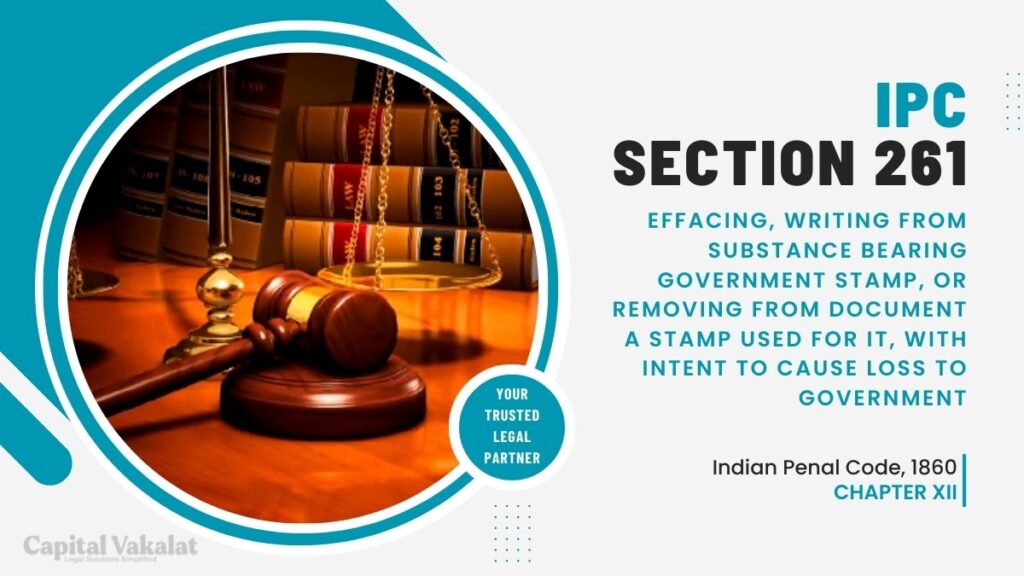Government stamps play a pivotal role in official documentation and financial transactions. They are not just pieces of paper; they represent a legal commitment to the government. To protect the integrity of these stamps, the Indian Penal Code (IPC) has a specific provision, Section 261 IPC, which deals with the offense of effacing, writing on a substance bearing a government stamp, or removing a stamp with the intent to cause loss to the government.

Section 261 of the Indian Penal Code, 1860, is a legal provision that addresses offenses related to government stamps. It aims to maintain the sanctity of government stamps and prevent fraudulent activities that may cause financial loss to the government.
Understanding the Purpose of Government Stamps
Government stamps are essential for a variety of documents, including agreements, contracts, court papers, property transactions, and more. They serve as evidence of payment of requisite duties and taxes and are often used to validate the authenticity of a document.
Exploring Section 261 IPC: The Offense of Effacing or Writing on Stamps
Section 261 IPC specifies three distinct actions that constitute an offense:
- Effacing: This involves intentionally erasing or obliterating any part of a government stamp, rendering it unusable for its intended purpose.
- Writing on Stamps: It is an offense to intentionally write or inscribe anything on a government stamp, including one’s signature or any other mark, which may invalidate its authenticity.
- Removing a Stamp: Removing a government stamp from a document or another substance, with the intent to reuse it elsewhere, is also a violation of this section.
Unpacking the Legal Aspects of Section 261 IPC
To comprehend Section 261 IPC more thoroughly, it’s crucial to grasp the following legal aspects:
- Criminal Intent: For an offense under this section to be established, criminal intent or a deliberate act is a fundamental element.
- Scope: This section applies to both public officers and private individuals. Any person found guilty of violating it can be prosecuted.
- Nature of Offense: Section 261 IPC is a non-cognizable offense. This means that the police cannot initiate action without a court’s direction, and it is bailable.
Intent and the Element of Loss to the Government
Intent plays a vital role in the application of Section 261 IPC. The intention to cause loss to the government is a critical factor. If the act of effacing, writing on, or removing a stamp is committed without such intent, it may not be considered an offense under this section.
Consequences and Penalties for Violating Section 261 IPC
The consequences of violating Section 261 IPC can be severe. Offenders may face penalties that can include fines and imprisonment. The punishment may vary depending on the specific circumstances of the case.
Notable Cases and Precedents
Over the years, several legal cases have dealt with offenses under Section 261 IPC. These cases provide insights into how the legal system interprets and applies this section.
The Significance of Stamp Duty in Revenue Collection
Government stamps and stamp duty are significant sources of revenue for the government. They fund various public services and infrastructure development. The violation of Section 261 IPC can potentially harm the revenue collection process.
How to Avoid Violating Section 261 IPC
To avoid inadvertently violating Section 261 IPC, individuals and entities should take the following precautions:
- Handle government stamps with care and ensure they are not defaced or damaged.
- Refrain from writing on or removing stamps from documents, except when authorized.
- Be aware of the legal implications and penalties associated with violations of this section.
Conclusion
Section 261 IPC is a crucial provision within the Indian Penal Code that safeguards the integrity of government stamps. Effacing, writing on, or removing a government stamp with the intent to cause loss to the government is a serious offense. Understanding the legal aspects, consequences, and intent involved is essential to ensure compliance with the law.
As responsible citizens, it is our duty to protect government stamps, as they play a vital role in revenue collection and maintaining the integrity of legal documents.
Frequently Asked Questions
What constitutes a violation of Section 261 IPC?
Violations include effacing, writing on, or removing a government stamp with the intent to cause loss to the government.
Are there any exceptions to Section 261 IPC?
Section 261 IPC does not apply if the actions are not done with criminal intent to cause loss to the government.
What are the potential consequences of violating Section 261 IPC?
Offenders may face penalties, including fines and imprisonment, depending on the circumstances of the case.
How can one avoid violating Section 261 IPC?
To avoid violations, handle government stamps carefully, refrain from unauthorized writing or removal, and be aware of the legal implications.